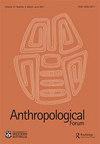在危机中重新想象时间:从科幻惊悚片和僵尸电影到年轻人的COVID-19生活时间
IF 0.9
3区 社会学
Q3 ANTHROPOLOGY
引用次数: 1
摘要
流行电影经常以世界末日的方式描绘流行病,短暂地描绘病毒如何日复一日地占领世界,恐惧如何增加。传播的速度,加上病毒似乎无法阻挡的全球传播,唤起了一种被非凡吞没的感觉,创造了一种以紧张和恐惧为特征的时间体验,无论是在屏幕上还是在屏幕外。相比之下,在2019冠状病毒病大流行期间,新西兰年轻人的生活现实表明,他们对时间的体验更加漫长、“空虚”,缺乏这种强度。我们对新西兰年轻人的采访显示,他们的时间感是不断变化的,偶尔会有恐惧和焦虑的时刻,但更多的是长时间的无聊和令人不安的缺乏结构,尤其是在封锁期间。本文借鉴巴赫金关于时间的概念,以及柏格森对生活时间体验的见解和德勒兹的电影书籍,将两部主要的科幻流行病电影《传染病》和《爆发》以及一系列流行的僵尸电影的情感时间性与新西兰年轻人在多次COVID-19封锁期间的生活经历进行比较。我们考虑了新西兰青年(在我们的采访中,以及在社交媒体上)如何通过利用由科幻电影、僵尸参考和自我道德观念组成的“富有想象力的节目”来叙述他们对COVID-19的生活经历,这可以帮助我们更好地理解在大流行期间,特别是对年轻人来说,时间性是如何重塑的。本文章由计算机程序翻译,如有差异,请以英文原文为准。
Re-imagining Time in the Midst of Crisis: From Sci Fi Thrillers and Zombie Flicks to Young People’s Lived Temporalities of COVID-19
ABSTRACT Popular films often depict pandemics in apocalyptic ways, temporally portraying how day by day, fear increases as a virus takes over the world. The speed of transmission, alongside the virus’s seemingly unstoppable global spread, evoke a sense of being engulfed by the extraordinary, creating an experience of time characterised by feelings of intensity and fear, both on and off-screen. In contrast, the lived realities of young New Zealanders during the COVID-19 pandemic speak to a more elongated, ‘empty’ experience of time that lacks such intensity. Our interviews with New Zealand youth revealed their sense of time as ever-shifting, characterised occasionally by moments of fear and anxiety, but much more so by long hours of boredom and disturbing lack of structure, particularly during lockdowns. This paper draws on Bakhtin’s notion of the chronotope, alongside Bergson’s insights into lived experiences of time and Deleuze’s Cinema books, to compare the emotional temporalities of two leading science fiction pandemic films, ‘Contagion’ and ‘Outbreak’, and a range of popular zombie movies, to young New Zealanders’ lived experiences of multiple COVID-19 lockdowns. We consider how New Zealand youth (in our interviews, but also on social media) narrate their lived experiences of COVID-19 by drawing upon an ‘imaginative repertoire’ made up of sci fi films, zombie references and moral ideas of the self, which can help us to better understand how temporality is reshaped during a pandemic, particularly for young people.
求助全文
通过发布文献求助,成功后即可免费获取论文全文。
去求助
来源期刊

Anthropological Forum
ANTHROPOLOGY-
CiteScore
3.60
自引率
10.00%
发文量
14
期刊介绍:
Anthropological Forum is a journal of social anthropology and comparative sociology that was founded in 1963 and has a distinguished publication history. The journal provides a forum for both established and innovative approaches to anthropological research. A special section devoted to contributions on applied anthropology appears periodically. The editors are especially keen to publish new approaches based on ethnographic and theoretical work in the journal"s established areas of strength: Australian culture and society, Aboriginal Australia, Southeast Asia and the Pacific.
 求助内容:
求助内容: 应助结果提醒方式:
应助结果提醒方式:


